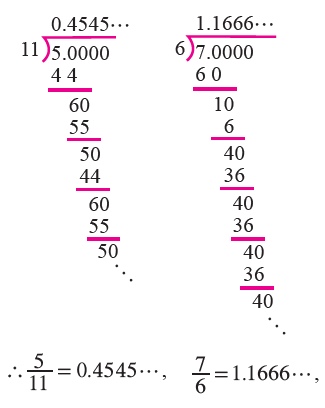DECIMAL REPRESENTATION OF RATIONAL NUMBERS
Subscribe to our ▶️ YouTube channel 🔴 for the latest videos, updates, and tips.
Let us consider the rational number p/q, where both p and q are integers and q ≠ 0.
We can get the decimal representation of the rational number p/q by long division division.
When we divide p by q using long division method either the remainder becomes zero or the remainder never becomes zero and we get a repeating string of remainders.
Case 1 (Remainder = 0) :
Let us express 7/16 in decimal form. Then 7/16 = 0.4375.
In this example, we observe that the remainder becomes zero after a few steps.
Also the decimal expansion of 7/16 terminates.
Similarly, using long division method we can express the following rational numbers in decimal form as
1/2 = 0.5
7/5 = 1.5
-8/25 = -0.32
In the above examples, the decimal expansion terminates or ends after a finite number of steps.
Key Concept (Terminating Decimal) :
When the decimal expansion of p/q, q ≠ 0 terminates (i,e., comes to an end), the decimal expansion is called terminating.
Case 2 ( Remainder ≠ 0) :
Does every rational number has a terminating decimal expansion?
Before answering the question, let us express 5/11 and 7/6 in decimal form.

Thus, the decimal expansion of a rational number need not terminate.
In the above examples, we observe that the remainders never become zero. Also we note that the remainders repeat after some steps. So, we have a repeating (recurring) block of digits in the quotient.
Key Concept (Non-terminating and Recurring) :
In the decimal expansion of p/q, q ≠ 0 when the remainder never becomes zero, we have a repeating (recurring) block of digits in the quotient. In this case, the decimal expansion is called non-terminating and recurring.
To simplify the notation, we place a bar over the first block of the repeating (recurring) part and omit the remaining blocks.
So, we can write the expansion of 5/11 and 7/6 as follows..
The following table shows decimal representation of the reciprocals of the first ten natural numbers. We know that the reciprocal of a number n is 1/n. Obviously, the reciprocals of natural numbers are rational numbers.
Number
Reciprocal
Type of Decimal
1
1.0
Terminating
2
0.5
Terminating
3
0.333.......
Non-terminating and recurring
4
0.25
Terminating
5
0.2
Terminating
6
0.1616.......
Non-terminating and recurring
7
0.142857142857.......
Non-terminating and recurring
8
0.125
Terminating
9
0.111.......
Non-terminating and recurring
10
0.1
Terminating
Thus we see that,
A rational number can be expressed by either a terminating or a non-terminating and recurring (repeating) decimal expansion.
The converse of this statement is also true.
That is, if the decimal expansion of a number is terminating or non-terminating and recurring (repeating), then the number is a rational number.
Practice Questions
Express the following rational numbers as decimal numbers.
1) 3/4
2) 5/8
3) 9/16
4) 7/25
5) 47/99
6) 1/999
7) 26/45
8) 27/110
9) 2/3
10) 14/9
Answers
1) 3/4 = 0.75
2) 5/8 = 0.625
3) 9/16 = 0.5625
4) 7/25 = 0.0.28
5) 47/99 = 0.474747.........
6) 1/999 = 0.001001001........
7) 26/45 = 0.577777........
8) 27/110 = 0.2454545.........
9) 2/3 = 0.6666........
10) 14/9 = 1.5555..........
Subscribe to our ▶️ YouTube channel 🔴 for the latest videos, updates, and tips.
Kindly mail your feedback to v4formath@gmail.com
We always appreciate your feedback.
©All rights reserved. onlinemath4all.com
Recent Articles
-
SAT Math Practice
Dec 05, 25 04:04 AM
SAT Math Practice - Different Topics - Concept - Formulas - Example problems with step by step explanation -
10 Hard SAT Math Questions (Part - 37)
Dec 03, 25 07:02 AM
10 Hard SAT Math Questions (Part - 37) -
Factorial Problems and Solutions
Dec 02, 25 09:27 AM
Factorial Problems and Solutions

